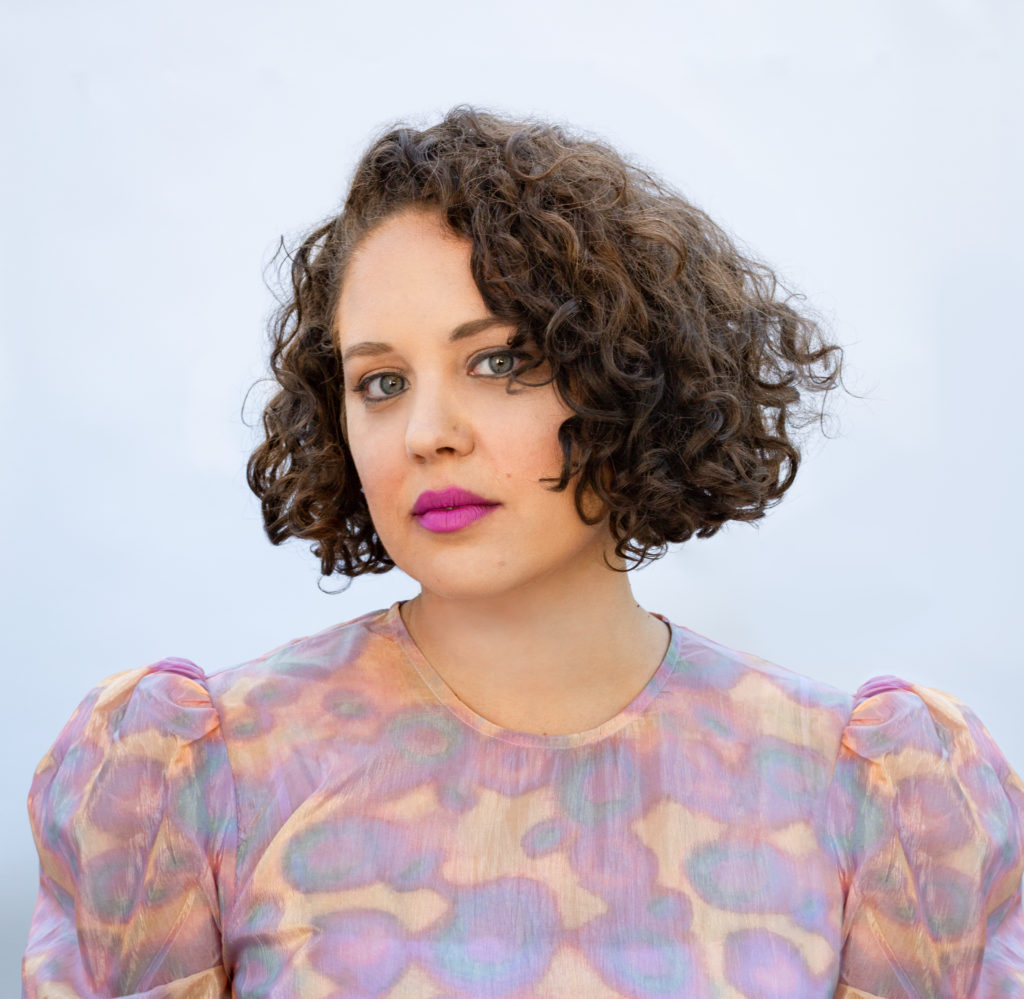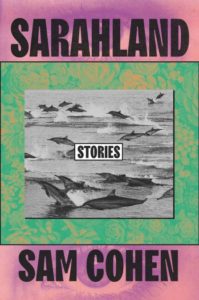
In Sarahland, a collection of stories woven together by characters named Sarah, Sam Cohen brilliantly and often hilariously explores the ways in which traditional stories have failed us. The cast of Sarahs finds ways to love the planet and those inhabiting it, and they discover new possibilities for life itself. In each Sarah’s refusal to adhere to a single narrative, she builds a place to live that demands no fixity of self, no plague of consumerism, no bodily compromise, a place called Sarahland.
Raki Kopernik: Sarah feels like she is a single person living through different eras, and the stories are all pieces of her, or some formation of the kind of person she is. Was the intention for her to be one person?
Sam Cohen: My intention was for that to be a question, whether this is one Sarah or many Sarahs. Obviously, logistically it’s impossible, because some of the stories are set far into the past and future. What I hope is that the Sarahs have distinct voices and sets of issues and concerns. I did want there to be some blurriness between them, to call into question what a singular identity means, so also, I think all the Sarahs do share a self. I’m interested in characters who don’t know what they want, who don’t have a clear sense of self, who don’t know how to live in the world as it is.
RK: As writers, we often use our personal experiences as a base for our work. How has your identity influenced the characters in your book? And do you think it’s important for our work to represent us, particularly as queers?
SC: I don’t know why I wouldn’t write queer characters. I’m always writing in order to teach myself something, and this is my version of a coming-of-age book. My editor described it as a coming-of-Sarah book. We started using “Sarah” as a word to mean all kinds of things, like the character who keeps trying to come of age in different ways and fails over and over again. I’ve heard this articulated around queerness as queer failure to come of age. I was on a panel at AWP about queer adolescence that insisted adolescence for queer people lasts and lasts. I find that idea very validating in terms of my own feelings around maturation and aging. Those ideas really informed my telling stories of people trying to create legible queer adulthood. I also feel driven by an anti-normative queer impulse, this question of how to come of age. I think you and I are both of an age that we assumed, as queer people, we were never going to get married. There wasn’t the choice of homo-normativity laid out.
RK: Right, we didn’t have that modeled to us (in the mainstream), so as artists and writers we have to process that through our own work, and to create that work.
SM: Yeah I think that’s true. Something that comes up in the book is that there also were these models, like Eileen Myles (non-binary poet, writer, and performance artist), these poets living for art and sex, being able to romanticize that life.
RK: I love your psychedelic retelling of the Torah story of Sarah in the story, “The First Sarah.” Is this the reason you chose the name Sarah to carry the rest of the book?

SC: I actually wrote that story toward the end. The way the book came to be about Sarahs was that my friend, Nikki Darling, was doing a series of stories about horse girls during the apocalypse. She assigned me the name Sarah and the age twelve, and from that I wrote the story, “All The Teenage Sarahs.” I didn’t really know what a horse girl was. I grew up in a Jewish suburb where that didn’t exist. But my dad used to go the racetrack when I was a kid, and I’d go with him. So I think, on the other hand, I really fantasized about horses as a kid because of that. I took those two concepts of the horse girl and just wanting to be twelve forever. I felt something in writing that story that I hadn’t yet felt in my work. Something unlocked, this feeling of appropriated pop culture, play, and a funnier voice.
RK: In the title story, “Sarahland,” you mention the cult movie Heathers, which was a huge part of my teenhood. In the movie, you could look at it the same way, that all these Heathers are pieces of one person. Did this movie play a part in creating the book?
SC: Yeah, Heathers is one of my favorite movies. I do think it influenced the story. It’s funny to have a group of girls who all have the same name, then have the Sarahs in that story interchangeable as their dominant trait. But in my story, Sarah the narrator does not feel interchangeable with the rest of them, which is her conflict, not knowing how to get out of being one of them.
RK: Your stories often take bold and unexpected turns, which is fresh and interesting. Some writers plan their stories out. I like to have a loose idea and then see where the story takes me, to allow it to be somewhat channeled. Did you know how each story would play out? What’s your process?
SC: No. I have a similar process of having a bit of an idea. I’d start with a problem or a place or an interaction. Like in, “Sarahland,” I started with a group of girls being funny in this dorm, which is a parody of a dorm I lived in that was a weirdly Jewish dorm. You know how things can just be like that, unofficially? I wanted to write about that. I’m not sure I know how to talk about Jewishness, but it’s so central to every part of who I am that I almost have no language for it. That’s something that I also don’t have a lot of models for (like queerness) thinking about how it makes sense for me. I wanted this sense of Jewish separatism in the story. And I don’t think that question gets answered. Then later, there’s a turn for me where the story becomes about consent and sexual assault.
RK: A lot of your stories have that dark humor, or that back and forth between funny and dark. And that tangles with Judaism too. There’s this holocaust reference in “Sarahland,” which is a quick, dark moment. You didn’t linger around it.
SC: I think a lot of that Jewish separatism I was raised in turned out to be about the erasing of the self. Heathers is funny and the main character is not a Heather, so she doesn’t have that problem. The Heathers can be shallow and comedic, but I was a Heather, being subsumed into this particular model of Jewish girlhood.
RK: Do you mean because you grew up in a bubble of Judaism that you had to be a certain way, like in JAP (Jewish American Princess) culture?
SC: Yes. I don’t want to talk about it in reference to myself, but with the narrator Sarah, for example, she has a non-consensual nose job early on.
RK: What genres inform your writing style?
SC: I’m very influenced by New Narrative, this movement that came out in the seventies, writers like Kathy Acker. It’s about hyperbolizing the self or mixing it with other selves from pop culture and literature, using those elements to figure out an emotional truth.
RK: I’m interested in the placement of the stories. Did you know which stories would go where?
SC: My editor did a lot of that work, but I did have some part in ordering it. I wanted the first three stories, which are more identity based, to come first. They’re really a sequence of Sarah failing to come of age and grasp identity. Ultimately, she doesn’t become something else. “Dream Palace” (the fourth story) is like an interlude, shifting to characters that are more a part of the world, bigger stories.
RK: What books or writers inspire you?
SC: Mary Gaitskill and Angela Carter.
RK: What do you think makes a great story?
SC: I like detailed observation, noticing things I haven’t seen or maybe have seen but haven’t had language for. Precise details that feel like they shift my consciousness as I’m reading until the story takes me somewhere. Something that opens me up in a way I didn’t expect, or that shifts the way that I re-enter the world.
RK: What’s your writing practice like?
SC: When I’m into something, I wake up, make my coffee and a smoothie, and sit down at my desk. As much as I can I like to transition from sleep to writing right away without looking at my phone or emails or talking to anyone. I do feel like my writer self is a different self than the one that interacts with people. It’s closer to that unconscious sleeping place where images and the creative self come from. I try to not shift into my interactive self at all.
RK: Is there something you want to work on next?
SC: I definitely don’t want to write more short stories. But maybe that will be what happens. My agent really believes in story collections, many of which have been very successful. She believes in literature and what she loves. But I want to write a novel, because that feels so real. And also a lot of nonfiction ideas have been coming to me. I’m doing a bit of both.
RK: How do you like living in LA?
SC: I love living in LA! But I’ve been here for twelve years, and I’m thinking about going on the academic job market next year, and the idea of maybe starting over somewhere also feels exciting.
RK: Come to Minneapolis! It’s not like New York, but there are a ton of queer Jews here.
SC: If I move it’ll be for a job.
RK: That’s the way to do it.
Pre-order Sarahland, here:
https://www.grandcentralpublishing.com/titles/sam-cohen/sarahland/9781538735053/
Read Sam Cohen’s stories:
https://bombmagazine.org/articles/sam-cohen-exorcism-or-eating-my-twin/
https://www.fenceportal.org/all-the-teenaged-sarahs/
https://weird-sister.com/2020/10/06/i-am-jenny-schecter-please-love-me/
SAM COHEN is the author of Sarahland (Grand Central Publishing, forthcoming March 2021). She is a queer, Jewish femme who was born and raised in suburban Detroit. Her fiction is published in Fence, Bomb, Diagram, and Gulf Coast, among others. The recipient of a MacDowell fellowship and a Ph.D. fellow at the University of Southern California, Cohen lives in Los Angeles. Follow her on Instagram @samiterrestrial.
RAKI KOPERNIK is a queer, Jewish fiction and poetry writer. She is the author of The Things You Left (Unsolicited Press 2020), The Memory House (The Muriel Press 2019) a 2020 Minnesota Book Award finalist, and The Other Body (Dancing Girl Press 2017). Her work has appeared in numerous publications and has been nominated for several other awards, including the Pushcart Prize for fiction and the Pen Faulkner Award for Fiction. She lives in Minneapolis. You can find her at https://rakikopernik.wixsite.com/mysite and follow on Instagram @rakikopernik.
